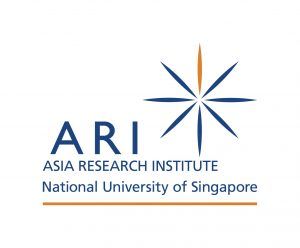Contact

Center for Asian Studies CASE Building, Suite E330
366 UCB
Boulder, CO 80309-0366
China_Made@colorado.edu
Partners

![]()




Environing Infrastructure: Communities, Ecologies, and China’s “Green” Development in Contemporary Southeast Asia, a five-year research project (2020-2025) funded by the Volkswagen Foundation. It is carried out by a team of researchers based at the Rachel Carson Center for Environment and Society, LMU Munich. It focuses on the environmental components of Chinese large-scale infrastructure development in Southeast Asia.

Nomadic Department of the Interior: The Nomadic Department of the Interior (NDOI) is a research collective that seeks to address, in films, websites, and publications, the conflicting interests between stewardship of lands & extraction of material and cultural resources. Our research investigates technological systems against the backdrop of geological, ecological and human history.

The Urban Spectre of Global China: Mechanisms, Consequences, and Alternatives for Urban Futures: an international collaborative aiming to uncover the differentiated models of urban production in the Global China era and to generate new insights for inclusive approaches to urban space, nature and modernity. Research sites include London, Iskandar Malaysia, Beijing and Foshan.

People’s Map of Global China: The People’s Map of Global China tracks China’s complex and rapidly changing international activities by engaging an equally global civil society. Using an interactive, open access, and online ‘map’ format, we collaborate with nongovernmental organisations, journalists, trade unions, academics, and the public at large to provide updated and updatable information on various dimensions of Global China in their localities. The Map consists of profiles of countries and projects, sortable by project parameters, Chinese companies and banks involved, and their social, political, and environmental impacts. This bottom-up, collaborative initiative seeks to provide a platform for the articulation of local voices often marginalised by political and business elites. It is our hope that the information collected by this networked global civil society will be a useful resource for policymaking, research, and international advocacy.

The Global China Center (GCC) at Hong Kong University of Science and Technology focuses on advancing a new paradigm of China Studies, in alignment with China’s global impacts and integration today. Established in mid-2019 and housed within the School of Humanities and Social Sciences, the Center seeks to foster interdisciplinary and multi-method research and teaching on global China. Leveraging Hong Kong’s international reputation and position as a global city, GCC is a world-class hub of cutting-edge scholarship and education on global China.

Feral Atlas invites you to explore the ecological worlds created when nonhuman entities become tangled up with human infrastructure projects. Seventy-nine field reports from scientists, humanists, and artists show you how to recognize “feral” ecologies, that is, ecologies that have been encouraged by human-built infrastructures, but which have developed and spread beyond human control. These infrastructural effects, Feral Atlasargues, are the Anthropocene. Playful, political, and insistently attuned to more-than-human histories, Feral Atlas does more than catalog sites of imperial and industrial ruin. Stretching conventional notions of maps and mapping, it draws on the relational potential of the digital to offer new ways of analyzing—and apprehending—the Anthropocene; while acknowledging danger, it demonstrates how in situ observation and transdisciplinary collaboration can cultivate vital forms of recognition and response to the urgent environmental challenges of our times.

Infrastructures of Chinese Modernity is a research group based at the Center for Advanced Security, Strategic and Integration Studies (CASSIS) at the University of Bonn. The group examines the transnational effects of China’s socio-technical transformation and its links to entangled processes beyond Chinese borders. Methodically, four different types of infrastructure – logistics, data, manipulation, and memory, with their unique Chinese “characteristics” – will be explored and compared. Case studies are driven by the question whether and to what extent China’s modernity develops constitutive effects, i.e. which fundamental ontological and discursive aspects of political, economic, and social orders elsewhere are influenced and coshaped.

Mekong Infrastructure Tracker at the Stimson Center. The Mekong Infrastructure Tracker platform is the premier resource for researchers to track, monitor, and quantify the development of energy, transportation, and water infrastructure assets and the social, economic, and ecological changes they bring to South East Asia. The Mekong Infrastructure Tracker was developed with support from the USAID Mekong Safeguards activity led by The Asia Foundation, with funding provided by USAID. Find data by browsing or searching, build new geographic information products, and explore existing maps and apps.

TRANSECT – Agrarian Transformations and Social-Ecological Complexities: Local Bioeconomy Scenarios in Central and South Asia. The junior research group TRANSECT (2019-2024) at Eberswalde University for Sustainable Development (HNEE), Germany, investigates the social-ecological effects and interdependencies of agrarian transformations and bioeconomy developments in Central and South Asia. Focusing on case studies in Pakistan, Tajikistan and Kazakhstan, which have been subjected to vast agricultural interventions in the past, the research also draws attention to the current and future growth of China’s bioeconomy sector and its repercussions for neighbouring countries. Particularly infrastructural development framed in the ‘Belt and Road Initiative’ are expected to shape future agricultural developments in the region. In the face of these changes, the research group provides in-depth analyses of local effects, opportunities and risks of agricultural intensification and other transformation pathways. Furthermore, we aim to generate a practice-oriented, integrative and participatory methodology in order to develop policy scenarios towards more socially just and ecologically sustainable bioeconomy pathways.

The Silk Road: Geocultural & Geostrategic Futures. China’s Belt and Road Initiative is emerging as a vast platform of heritage diplomacy. It challenges us to develop new ways of thinking about diplomacy and great power competition, and how culture and history are used for political gain in the twenty-first Century. As multiple players invest in the idea of “reviving” the Silk Roads, we are seeing new forms of cultural globalization and strategic ties form across Eurasia and Africa.
AGORA: The age of infrastructure: China as a global urban agent, funded by the University of Manchester Research Institute, seeks to explore how Chinese infrastructural investment reconfigures relations between cities, regions and nation states.

Highland Asia: Remoteness & Connectivity: Highland Asia in the World is a five-year research project (2015-2020) funded by the European Research Council. It is carried out by a team of researchers based at the Department of Social and Cultural Anthropology, Ludwig Maximilian University of Munich, Germany.

Crossroads Asia: Crossroads Studies brings together theoretical and methodological considerations and experiences from the six years existence of the Crossroads Asia project. The courses and teaching materials build in large part on the insights from the more than 20 working packages and provide novel ideas as to how to conduct Area Studies in the 21st century.

Reconnecting Asia: Reconnecting Asia maps new linkages—roads, railways, and other infrastructure—that are reshaping economic and geopolitical realities across the continent. Through data curation and objective analysis, the project aims to fill Asia’s infrastructure-information gap, squaring lofty ambitions with facts on the ground. Our methodology explains the science and art behind these efforts.

Following The Wires: The project follows the wires that crisscross the skyline and buildings of Beirut and uses the responses to electricity disruption to make sense of the legacy of the conflicts that have affected Beirut.This work builds on innovative approaches from film practice, ethnography and sociology, to show how discrepancies in access to energy can be used to articulate the lasting impact of conflicts on everyday lives and the urban environment. The project will produce a documentary film to articulate the everyday experiences of people living with power outages in the Lebanese capital, paying close attention to how informal electricity networks redesign the urban landscape.

Making Modernity in East Asia: The main objective of Making Modernity in East Asia is to establish a new, interdisciplinary way of understanding East Asian modernity through the lens of everyday technology. Our focus on everyday technologies – the ordinary, unglamorous and widespread technologies used in our everyday life – shifts the emphasis from old, exhausted questions on “who invented what first”, or “technological failure, imitation or catching up”, to how technology was and is put to use in East Asia. The research team’s ambition is to build a sustainable platform to synergies research on this topic that has never been treated systematically, and to create in four years an Area of Excellence which will make Hong Kong the world research center for the study of technology and East Asian society. The project is affiliated with Hong Kong University.

Borders, Mobilities and New Infrastructures: Supported by the Max Weber Foundation the Research Group on Borders, Mobility and New Infrastructures was established in FASS in June 2017 at National University of Singapore. Our foci are changing cross-border infrastructures, borderscapes, and new scales and spaces of interaction. We are particularly interested in Japan’s multi-faceted role in Southeast Asia.

Roads and the Politics of Thought: ‘Roads’ is a five year ethnographic research project on infrastructure development in South Asia. The project, funded by the European Research Council, will provide the first ethnographic account of the culture of ‘road builders’, their knowledge practices, interrelations and motivations. ‘Roads’ is headed by Edward Simpson, Professor in Social Anthropology at SOAS, University of London. Simpson will work with research partners at the University of Edinburgh, and an award-winning collective of contemporary artists, CAMP, who are based in Mumbai, India.

Infrastructures of Democracy: Infrastructures of Democracy is the website for a research project entitled Infrastructures of Democracy: State Building as Everyday Practice in Nepal’s Agrarian Districts, funded by the Social Sciences and Humanities Research Council of Canada. The project is comprised of several nested scales of collaboration. Core research teams are based at the University of Toronto and the University of British Columbia (co-PIs and affiliated doctoral students) and at the Martin Chautari Research and Policy Institute in Kathmandu, Nepal (Research Fellow and Tribhuvan University doctoral students). Two peer researchers participate from three district-scale research sites in Nepal. A group of prominent scholars and policy makers in Canada and Nepal serve as collaborators to the research in an advisory capacity.

Road Work Asia: ‘ROADWORK: An Anthropology of Infrastructure at China’s Inner Asian Borders’ is a four-year research project (2018-2022) funded by the Swiss National Science Foundation and based at the Department of Social Anthropology and Cultural Studies at the University of Zurich. The project team will conduct ethnographic fieldwork along roads that have been designated as key links at the Sino-Inner Asian interface of the China-initiated Silk Road Economic Belt. Archival research and GIS analysis, two further research methods employed by the team, will help to identify social relations and temporalities that are difficult to capture through ethnography, but which nonetheless powerfully affect roads and travel in this region of Asia. The conceptual aim of the project is to propose a novel framework to theorize the social life of roads through a dialogue with the concepts of place and time, and to bring decay and maintenance to the centre of anthropological enquiry.

Technology ‘s Stories: Technology’s Stories is published by The Society for the History of Technology (SHOT). We engage readers with the usable past—stories that help us make sense of contemporary technological challenges and aspirations. Technology’s Stories is a place for thinkers to share new insights on the integration of technology with our environments and our social, political, and economic lives.

Arctic Silk Road. “Arctic Silk Road: Imagining Global Infrastructures and Community Boundaries in Sápmi and the Russian North,” is a project funded by the Research Council of Norway. It follows the anticipation of global infrastructures across time and space. We focus on lived experiences of not-yet-realized constructions in Sápmi and along the northern Russian coast, connected to the Northern Sea Route and Polar Silk Road, but also comparative cases of large-scale infrastructural networks historical and emerging.

New Silk Roads: The New Silk Road project is dedicated to promoting evidence research and education on national and international efforts to improve the infrastructure and connectivity among the countries of Asia and Europe. It brings together over 750 teachers and researchers from a wide range of disciplines and working in over 80 countries. Membership is open to all.